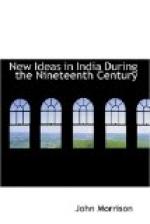[Sidenote: These parallels ineffective.]
[Sidenote: Christ Himself attractive.]
But it must be confessed that these parallels, real or supposed, between Christianity and Hinduism have not brought Christ home to the heart of India. In themselves, they only bring Christianity as near to Hinduism as they bring Hinduism to Christianity. Uneducated Hindus feel that the two religions are balanced when they have Krishna and Christians have Christ. Educated Hindus, as we shall see, are employing some of these very parallels to buttress Hinduism. Far be it from me, however, to depreciate the labours of scholars and earlier missionaries who have thus established links between Hindus and Christians, and have thus at least brought Christ into the Hindu’s presence. To Indian Christians also such reasoning has often been a strength, furnishing as it were a new justification of their baptism into Christianity; for looking back they can perceive the finger of Hinduism itself pointing the way. But had no other influence been exerted on the Indian mind, one could not say what I now say, that Christ Himself is the feature of Christianity that has most powerfully moved men in India. The person of Christ Himself has been the great Christian dynamic. I am now speaking of educated India, the India that is not dependent solely upon the preacher for its religious ideas and feeling.
[Sidenote: Christianity identified with Britain and therefore unpopular.]
[Sidenote: The anti-foreigner instinct.]
The grand new political idea in India is the idea of nationality, and one of its corollaries is the championing of things Indian and depreciation of things British. The strong anti-British bias among the educated is one of the noteworthy and regrettable changes in the Indian mind within the last half-century. It is not surprising then that all over India the influence of Christ and of Christianity is lessened from the identification of Christianity with the British. For a native of India to accept the British religion is to run counter to the prevailing anti-British and pro-Indian feeling; it is unpatriotic to become a convert to Christianity. “Need we go out of India in quest of the true knowledge of God?” wrote a distinguished Indian litterateur a few years ago.[94] All that feeling is of course in addition to the instinctive hostility to things foreign that has been nowhere stronger than in self-contained India—self-contained between the Himalayas and the seas. The exclusiveness of caste is based upon that feeling. The statement of the late Rev. M.N. Bose, B.A., B.L., a native of Eastern Bengal, regarding his youth [1860?] is: “I had a deep-rooted prejudice against Christianity from my boyhood.... At this time I hated Christianity and Christians, though I knew not why I did so."[95] We find the instinctive hostility more bluntly expressed in China in the cry that drops spontaneously from the opening lips of many Chinamen, as their greeting, when they unexpectedly behold a European. The involuntary ejaculation is: “Strike the foreign devil.”




